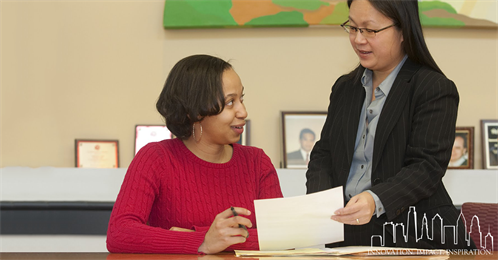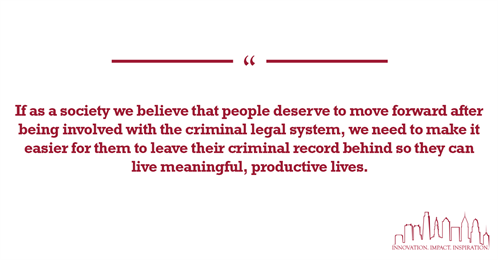
Ed. note: Temple Law School has always been “home” to passionate students who don’t wait for graduation to use their advocacy skills in service to the community. The Temple National Lawyers Guild Expungement Project is one way these students have found to make an impact now. We checked in with 2L Emily Bock, who organizes student volunteers through the Temple Law chapter of the National Lawyers Guild, to find out more about the Project.
TLS: What is the Expungement Project, and how are you involved?
EB: The project is a collaboration between Community Legal Services of Philadelphia (CLS) and the Temple Law chapter of the National Lawyers Guild (NLG). Together with 3Ls Anna Kessler and Theo Cornetta , and 2L Elizabeth Owens, I organize Temple Law students who want to volunteer in expungement clinics run by CLS. Although the project “lives” under the NLG chapter, the opportunity to volunteer is open to all Temple Law students. So far, we have trained about 43 law student volunteers.
TLS: How did the idea come about and what did you do to make it happen? What support is NLG providing?
EB: I started doing criminal records work as a Haverford House Fellow/Paralegal at Community Legal Services, and as soon as I got to Temple Law I was thinking about what I could do to get an expungement project started. At the end of my first year, some of my former colleagues from the Employment Unit at Community Legal Services approached me and asked if I would be able to help organize student volunteers to assist with community intake clinics so they could expand their expungement work and of course I gladly accepted. We work with CLS to train student volunteers to conduct an interview and then place them in community intake clinics throughout the city. CLS works with community organizations and members of City Council to establish clinic sites within the community and to advertise their presence.
TLS: What is expungement? Who can qualify for it and what can you do to help them? Why is it important for your clients?
EB: An expungement itself is a petition to the Court of Common Pleas in which the petitioner asks that the judge order the records of the charges to be destroyed (cleared from the state court database, from the Pennsylvania State Police database, from local law enforcement databases, etc.). In Pennsylvania, expungements are most often used to clear non-conviction information from a person’s criminal record. A non-conviction is usually a charge that has been dismissed, withdrawn, found not guilty, or some type of diversionary program that has been successfully completed. In some cases, summary convictions can be expunged if certain criteria are met. Misdemeanor and felony convictions cannot be expunged unless the person is over 70 years old and has been arrest-free for 10 years or has been dead for a certain amount of time, or if they have received a pardon from the governor of Pennsylvania.

TLS: Why is the Expungement Project important to you?
EB: Criminal records work is important to me because I see it as a part of a broader mission of economic and racial justice. We know that most people who come into contact with the criminal legal system are from communities of color and are low-income. After coming into contact with the criminal legal system, and depending on the outcome of the particular charges, people can often face serious repercussions in other parts of their lives – employment, housing, public benefits, voting, etc. If as a society we believe that people deserve to move forward after being involved with the criminal legal system, we need to make it easier for them to leave their criminal record behind so they can live meaningful, productive lives.
TLS: What have you learned at Temple Law that brought you to this work, and what has working on this project taught you?
EB: I have found my work with Professor Lee in the Sheller Center to be a particularly useful complement to the work I do with the expungement clinics. I was in the Social Justice Lawyering Clinic last semester and we talked a lot about the benefits of working with clients in their communities, and also how organizing clients/community members to address a systemic issue can be beneficial. While those themes don’t necessarily apply in the expungement clinics (except meeting with clients in their communities), the analytical framework I got from the Social Justice Lawyering Clinic has been very useful as I move forward with this work.
TLS: Why did you come to law school, and what are your plans for after graduation?
EB: I came to law school to become a public interest lawyer, and after law school I hope to work with a legal aid office (hopefully doing criminal records and/or employment work) or with a local public defender’s office.
